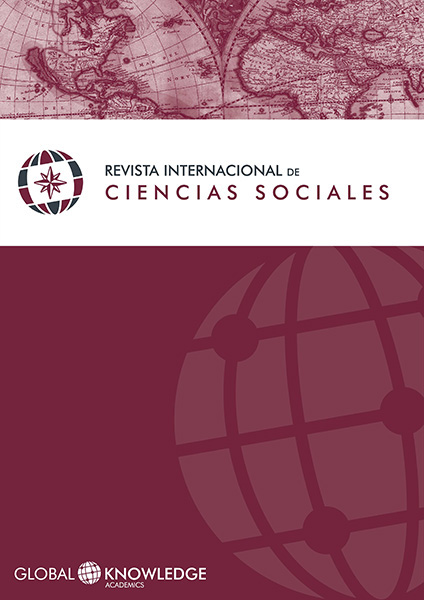The Discursive Construction of Andalusian Identity and Collective Memory Play in the Series the Answer Lies in History
DOI:
https://doi.org/10.37467/gka-revsocial.v4.798Keywords:
Social Identity, Collective Memory, Discursive Strategies, AndalusiaAbstract
This study aims to analyze the discoursive representation of andalusian collective identity and memory in the television series “La respuesta está en la historia”. I will reflect the theoretical approach of the social construction of identities and I will use the methodology of the critical discourse analysis to identify, classify and explore the basic discoursive strategies that are reproduced by the television series.
Downloads
Global Statistics ℹ️
|
444
Views
|
498
Downloads
|
|
942
Total
|
|
References
Aguiar, F. y Espinosa, E. (2011). Identidad andaluza y realidad nacional. Madrid: Instituto de Estudios Sociales Avanzados.
Assmann, J. (2001). Kultura a paměť: Písmo, vzpomínky a politická identita v rozvinutých kulturách starověku . Praga: Portál.
Barš a, P. (2006). Konstruktivismus a politika identity. AntropoWEBZIN, 1. Disponible en: http://antropologie.zcu.cz/konstruktivismus-a-politika-identity (28. 2. 2011).
Berger, P. L. y Luckmann, T. (1999). Sociální konstrukce reality. Pojednání o sociologii vědění. Praga: CDK.
Brubaker, R. y Cooper, F. (2000). Beyond “Identity“. Theory and Society , 29 (1), 1 – 47. DOI: https://doi.org/10.1023/A:1007068714468
CADPEA (2013). EGOPA verano 2013. Estudio General de Opinión Pública de Andalucía. Granada: Universidad de Granada.
Calhoun, C. (ed.). (1994). Social Theory and the Politics of Identity . Cambridge: Blackwell.
De Cillia, R., Reisigl, M. y Wodak, R. (1999). The Discursive Construction of National Identities. Discourse & Society , 10 (2), 149 – 173. DOI: https://doi.org/10.1177/0957926599010002002
Días Bustos, N. (211-2012). La respuesta está en la Historia [serie documental de Canal Sur Andalucía]. Extraído de: http://alacarta.canalsur.es/television/programa/la-respuesta-esta-en-lahistoria/159
Eisenstadt, S. y Giesen, B. (2003). Konstrukce kolektivní identity. En Hroch, M. (ed.), Pohledy na národ a nacionalismus: čítanka textů. Praga: Sociologické nakladatelství.
Erickson, E. H. (1968). Identity: Youth and Crisis . New York: Norton.
Fairclough, N. (1995). Critical Discourse Analysis . Boston: Edison Wesley.
Fairclough, N. (2001). Language and Power . New York: Longman.
Fairclough, N. (2003). Analysing Discourse: Textual Analysis for Social Research . London: Routledge. DOI: https://doi.org/10.4324/9780203697078
Ferguson, J. et al. (2009). Constructing meaning in the service of power: An anylisis of the typical modes of ideology in acounting textbooks. Critical Perspectives on Acounting , 20, 896 – 909. DOI: https://doi.org/10.1016/j.cpa.2009.02.002
Foucault, M. (2002). Archeologie vědění . Praga: Hermann & Synové.
Gleason, P. (1983). Identifying Identity: A Semantic History. The Journal of American History, 69 (4), 910-931. DOI: https://doi.org/10.2307/1901196
Habermas, J. (2000). Strukturalni přeměna veřejnosti . Praga: Filosofia.
Halbwachs, M. (1950). On Collective Memory . Chicago: University of Chicago Press.
Halliday, M. (1994). Introduction to Functional Grammar . London: Edward Arnold
Hoover, K. R., Marcia, J. y Parris, K. (1997). The Power of Identity. Politics in a New Key. Chatham: N.J., Chatham.
Latorre, G. y Vega, O. (2003). Del dicterio al encomio. Estrategias semánticas generales y la imagen de las superpotencias en El Siglo de Chile (1957 – 1962). Estudios Filológicos, 38, 31 – 47. DOI: https://doi.org/10.4067/S0071-17132003003800003
McQuail, D. (1985). La introducción a la teoría de comunicación de masas . Barcelona: Paidos Ibérica.
Müller, K. (2007). Formování pozitivních identit mezi minulostí a budoucností. Př íspě vek k projektu evropské identity. Sociologický časopis , 43 (4), 785–807. DOI: https://doi.org/10.13060/00380288.2007.43.4.07
Müller, K. (2008). Evropa a občanská společnost. Projekt evropské identity. Praga: Sociologické nakladatelství.
Nora, P. (1989). Between Memory and History: Les Lieux de Memoire. Representations , 26, 7 – 24. DOI: https://doi.org/10.2307/2928520
Ricouer, P. (2000). La Memoria, la Historia, el Olvido . Buenos Aires: Fondo de Cultura Economica.
Sal Paz, J., Maldonado, S. (2009). Estrategias discursivas: un abordaje terminológico. Espéculo. Revista de estudios literarios , 14(43). Extraído de: http://pendientedemigracion.ucm.es/info/especulo/numero43/abotermi.html
Szaló, C. y Nosál, I. (eds.). (2003). Mozaika v re-konstrukci . Brno: IIPS
Šubrt, J. (2011). Antinomie sociální pamě ti. Sociológia , 43(2), 133 – 157.
Thompson, J. B. (1990). Ideology and modern culture: critical social theory in the era of mass communication . Stanford: Stanford University Press. DOI: https://doi.org/10.1515/9781503621886
Todorov, T. (1998). Paměť př ed historií. Antologie francouzských společenských věd: Politika paměti. Cahiers du Cefres, 17, 33 – 46.
Vaš át, P. (2009). Kritická diskursivní analý za: sociální konstruktivismus v praxi. Přehledové studie, 4, CAAT.
Van Dijk, T. y Ródrigo Mendizábal, I. (1999). Análisis del Discurso Social y Político . Quito: Abya-Yala.
Wodak, R. y Meyer, M. (ed.) (2001). Methods of Critical Discourse Analysis . London: Sage Publications. DOI: https://doi.org/10.4135/9780857028020
Wodak, R. et al. (1999). Discursive Construction of National Identity . Edinburgh: Edinburgh University Press.
Downloads
Published
How to Cite
Issue
Section
License
Those authors who publish in this journal accept the following terms:
-
Authors retain copyright.
-
Authors transfer to the journal the right of first publication. The journal also owns the publishing rights.
-
All published contents are governed by an Attribution-NoDerivatives 4.0 International License.
Access the informative version and legal text of the license. By virtue of this, third parties are allowed to use what is published as long as they mention the authorship of the work and the first publication in this journal. If you transform the material, you may not distribute the modified work. -
Authors may make other independent and additional contractual arrangements for non-exclusive distribution of the version of the article published in this journal (e.g., inclusion in an institutional repository or publication in a book) as long as they clearly indicate that the work was first published in this journal.
- Authors are allowed and recommended to publish their work on the Internet (for example on institutional and personal websites), following the publication of, and referencing the journal, as this could lead to constructive exchanges and a more extensive and quick circulation of published works (see The Effect of Open Access).













